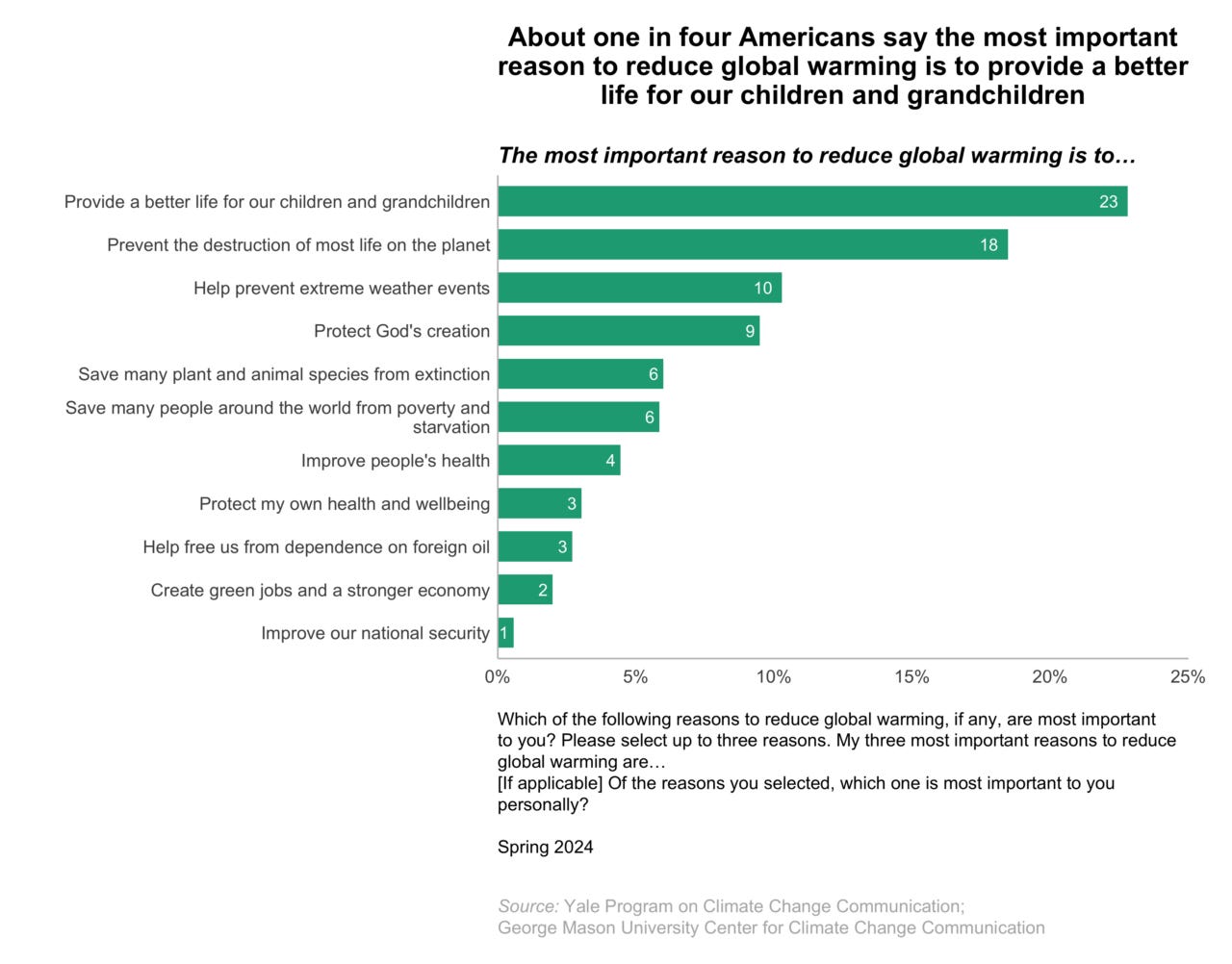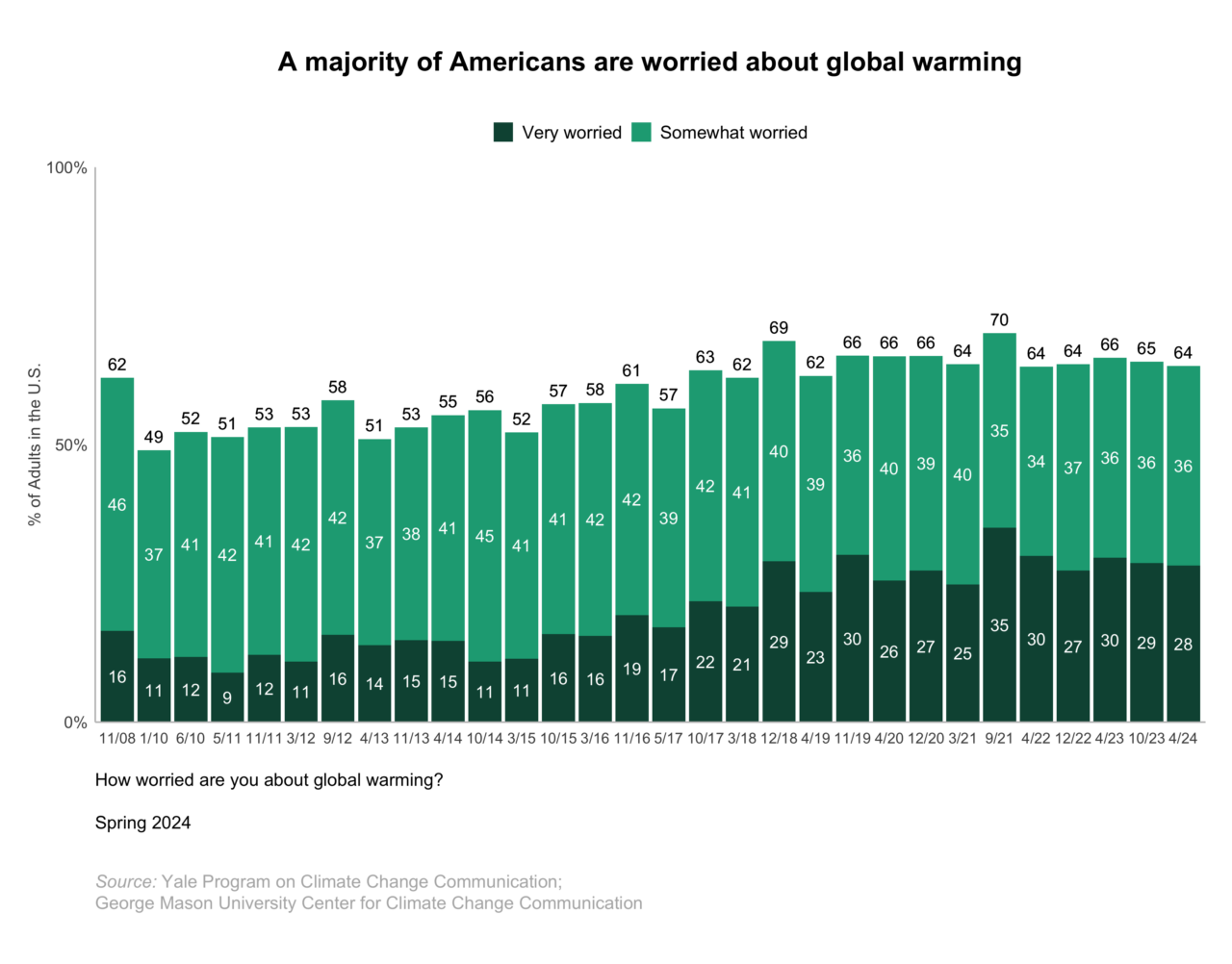It’s a self-defeating spiral. The majority of Americans are worried about global warming. It ought to be our number-one issue, but we don’t talk about it because voters don’t rate it as important for the election. They don’t rate it as important, because we never talk about it! The GOP deny that it exists and the media has a stake in keeping it quiet. Why let them set the agenda? It’s a winning issue for us. We can MAKE it important. Here’s how to talk to voters about the climate.

What to Say
If I were a candidate, this is what I would say in a speech:
Short Version
“You've all seen what’s happening with our weather, (with it) becoming increasingly dangerous and destructive. We have to do whatever it takes to stabilize our climate, not just because it will be “good for the economy,” but because we live here! We need to keep our climate in that “Goldilocks” zone: not to hot, not too cold!
We have to do this for ourselves and for our children. This might be the biggest challenge we've ever faced, and we have to face it head on, but not only CAN we do this: we're ALREADY doing it, and there are big, concrete things we can do right now to accelerate that progress. We need to keep the pressure on, and to do that we need your votes!”
Long Version
“We have to stabilize our climate.
We all know that the conversion to clean, renewable energy will create jobs and save people money. But even if it didn’t, even if it cost every penny we had, we’d still have to do whatever it takes. You know why? Because this is where we live.We are human beings. Our lives depend on this very delicate balance of conditions. You’ve seen the dangerous and destructive weather, the droughts, the floods and the fires. We have to reduce the destabilizing effect that fossil fuel pollution has on our climate.
But he’s the deal: we CAN stabilize our climate. We are already doing it. We are turning the tide in this great battle, thanks to the Biden-Harris administration. We just have to keep pushing forward.
There are two things we can do that will have enormous impact right now. First: We can buy time by cutting methane emissions. Methane is a powerful short-term greenhouse gas. Biden and Harris have already started holding companies accountable for methane leaks. We can get quick results and buy ourselves more time by capping the millions of old oil wells that are leaking methane.
Second, we have to clear up some bottlenecks by building new transmission lines for the nearly 12,000 new solar, wind and energy storage projects currently waiting to come online.
We have to face this challenge head on. We have to do whatever it takes to stabilize our climate, for each other and for our children, but we are doing it and we can continue to do it, with your help.
This is not something we can solve on our own. We have to work together: we have to use our government to do big things, to take action, to solve problems and take care of each other. That’s what government is for.The biggest obstacles we face are the corporate-backed Republicans in Congress, a Republican nominee in the pocket of Saudi Arabia and Russia, and global oil conglomerates that are using their vast greed-driven profits to fight us in the courts.
That’s why we need you to vote for Democrats and build the strong Democratic majorities we need to overcome this opposition. It is your voices and your votes that will make the difference.
Thank you for reading Reframing America! To make sure you don’t miss a column, subscribe now to receive new posts by email!
This work is reader supported. All content is free, but some people choose to become paying subscribers. I need your support to continue this critical mission of improving our messaging for this election!
Why This Message Works
Visualizing Stability
Decades ago, we succeeded in mobilizing humanity to close the hole in the ozone layer. The truth is that it was never actually a hole. They called it one, because they knew that people could grasp the idea of taking action to “close the hole.”
We talk about “fighting global warming” or “fighting the climate crisis” but it feels futile to fight a problem when you can’t visualize a positive outcome. We need language for what success looks like.
People feel fear and uncertainty. Our weather system is increasingly erratic and unpredictable, like it’s spinning out of control. We need to restore balance to the system. We do that by stabilizing the climate, the way we might stabilize a collapsing building or a patient in the E.R. To people’s emotions, “stabilized” means “out of immediate danger.”
The term “stabilize” also allows us to talk about all of the things that “destabilize” the climate, like fossil fuel pollution.
Moral Imperative: Biological Dependence
We have to talk in terms of why this is morally necessary. It’s not about “saving” the planet or our climate. They will be fine without us. What matters is our relationship to the climate: that we are biologically dependent on it. We need to protect our human habitat. We need to protect the delicate set of ecological conditions capable of supporting human life.
When talking about weather, “extreme” just means that it’s not normal. It doesn’t convey why it’s a problem for us. Talk about “dangerous,” “damaging,” or “destructive” weather. These terms allow us to elaborate on the many ways in which climate instability is impacting people’s lives right now.
Not About Economics
The majority of our current messaging is about the economic benefits of conversion to a renewable energy economy. First, this frames the debate from a conservative perspective, as though “what’s good for the economy” is more important than what’s good for people.
Second, this is based on the failed theory that people make decisions based on rational self-interest. People make decisions based on moral imperatives, what they feel to be right and wrong in principle, not on what’s best for themselves. See notes below for more.
Overcoming Denial and Avoidance
Talking about the climate only in terms of jobs makes us sound delusional. Trying to motivate people with fear just makes people feel hopeless. Either way, we encourage denial, suppression and avoidance.
We have to face the challenge head on and make hope sound believable.
For people to believe that we can stabilize the climate, we have to show them the path from here to there. They need to know that we understand the severity of the problem and that we are facing it. They need to know that we are taking action and making progress already, not just that we’re spending a lot of money on this or that, but what the impact has been or will be.
We need to rally people to action in support of a few specific easy-to-comprehend projects, like capping millions of oil wells and building new transmission lines. People can visualize them being done and understand their strategic impact: “buying time” and “clearing up bottlenecks.”
The problem seems dauntingly huge. For people to feel hope, the solutions need to sound plausible, and that means they also need to sound sufficiently huge. Individual actions just feel pointless. People need to know that we are doing this together, particularly that we are mobilizing government to do together what we can’t do on our own.
Appeal to Action
Last but not least, make sure they understand the connection between political action and progress: who is on their side, who is standing in the way, and how their votes will make all the difference.
Miscellaneous Language
Please stop saying “existential threats.” This isn’t a threat to the meaning of life. Say, “A threat to our existence,” if you must.
Bumper Stickers:
“STABILIZE THE CLIMATE: Support Clean Energy”
“Keep our climate HEALTHY FOR HUMANS!”
A nice, if slightly more formal, statement:
“There is no priority higher than preserving the delicate conditions necessary to support human life, and no price higher than the cost of doing nothing.”
THANK YOU, as always, for reading, subscribing, and all that you do to make our world a better place!
In solidarity,
Antonia
Contact me with any questions about language use and attribution, consulting and custom content at: antonia@antoniascatton.com or (202) 922-6647.
NOTES:
As you can see below, “create green jobs and a stronger economy” was listed as the “most important reason to reduce global warming” by only 2% of respondents, as opposed to 23% for “providing a better life for our children and grandchildren,” 18% for “preventing the destruction of most life on the planet” and 10% for “help prevent extreme weather events.”
I would have recommended rephrasing the second response as “preserving the conditions that sustain all life on the planet.”
George Mason University Center for Climate Change Communication
Climate Change in the American Mind: Beliefs & Attitudes, Spring 2024










Here is what Paula Poundstone said about global warming in a letter to a fan:
Ninety-seven percent of actively publishing climate scientists believe that climate change is real, and that it is caused by human activity. The effects of climate change will be catastrophic. Trump insists that there is no such thing as climate change. He says, “It’s just weather.” A Trump administration would shut down the E.P.A., and not allow the use of the phrase “climate change.”
Sir, in our lifetime, you and I may only experience flooding, heat, environmentally driven refugee crises, additional pandemics, and maybe some food shortages, if the world doesn’t focus on this problem, but the younger generation will be devastated within their lifetimes. Are you okay with that? Should we not encourage people to use their votes to elect people who will work to save the Earth? I have to. Maybe you don’t feel that you have to, but I have to.
Our economy, based squarely on oil, is a danger to our economy, our health and our homeplace. The transition to safety and stability involves a deep structural change in the economy itself, so that fossil fuels are not the major profit center, and — if possible — major corporations do not have a choke-hold on supply and profits that allows them to buy judges and politicians and skew the economy & the government to their selfish ends. Tall order; but the alternative is catastrophic.